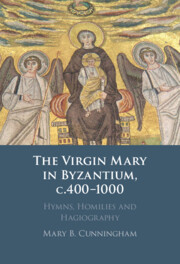I apologise that this book displays the usual inconsistencies that afflict most publications in Byzantine Studies, owing to the difficulty of reconciling clarity with changing trends in presentation. I have decided to follow traditional spellings or versions of names that are well known to modern readers, such as John Chrysostom or John of Damascus. However, I have adopted the hellenised version of less common names, such as Nikephoros or Proklos. In general, the latter follow the rules for spelling that are set out in the Oxford Dictionary of Byzantium (ODB). I capitalise the names of Marian feasts (such as the ‘Annunciation’ and the ‘Dormition’), but not the events or legends that inspired them. My object, above all, is to present a book that is understandable and attractive to modern readers. Fashions will no doubt change, but I hope that my choices in presentation will endure at least as long as the content remains useful. A more serious, but also unavoidable, problem has been my inability to incorporate some recently published texts, such as the new edition of the Book of Ceremonies by Constantine VII Porphyrogennetos (ed. G. Dagron, B. Flusin and D. Feissel, Paris, 2020, in 5 vols.). Owing to the slow process of preparing a work for publication, it is impossible to keep up with all of the latest developments in the field. Nevertheless, it will remain for future scholars to advance and refine some of the ideas that I present in this book.
Book contents
- The Virgin Mary in Byzantium, c. 400–1000
- The Virgin Mary in Byzantium, c. 400–1000 CE
- Copyright page
- Dedication
- Contents
- Acknowledgements
- Additional material
- A Note on Capitalisation, Spelling and Recent Publications
- Introduction
- Chapter 1 Praise of Mary in Song: The Early Hymnography
- Chapter 2 From Theotokos to Intercessor: The Early Homiletic Witness (c. 400–600)
- Chapter 3 Panegyrics and Supplication: Homilies from c. 600 to 1000
- Chapter 4 Theology in Verse: Middle Byzantine Hymnography
- Chapter 5 Narratives about the Panagia
- Conclusion
- Bibliographies
- Index
A Note on Capitalisation, Spelling and Recent Publications
Published online by Cambridge University Press: 20 August 2022
- The Virgin Mary in Byzantium, c. 400–1000
- The Virgin Mary in Byzantium, c. 400–1000 CE
- Copyright page
- Dedication
- Contents
- Acknowledgements
- Additional material
- A Note on Capitalisation, Spelling and Recent Publications
- Introduction
- Chapter 1 Praise of Mary in Song: The Early Hymnography
- Chapter 2 From Theotokos to Intercessor: The Early Homiletic Witness (c. 400–600)
- Chapter 3 Panegyrics and Supplication: Homilies from c. 600 to 1000
- Chapter 4 Theology in Verse: Middle Byzantine Hymnography
- Chapter 5 Narratives about the Panagia
- Conclusion
- Bibliographies
- Index
Summary
- Type
- Chapter
- Information
- The Virgin Mary in Byzantium, c.400–1000Hymns, Homilies and Hagiography, pp. xiiPublisher: Cambridge University PressPrint publication year: 2022
- Creative Commons
- This content is Open Access and distributed under the terms of the Creative Commons Attribution licence CC-BY-NC-ND 4.0 https://creativecommons.org/cclicenses/

